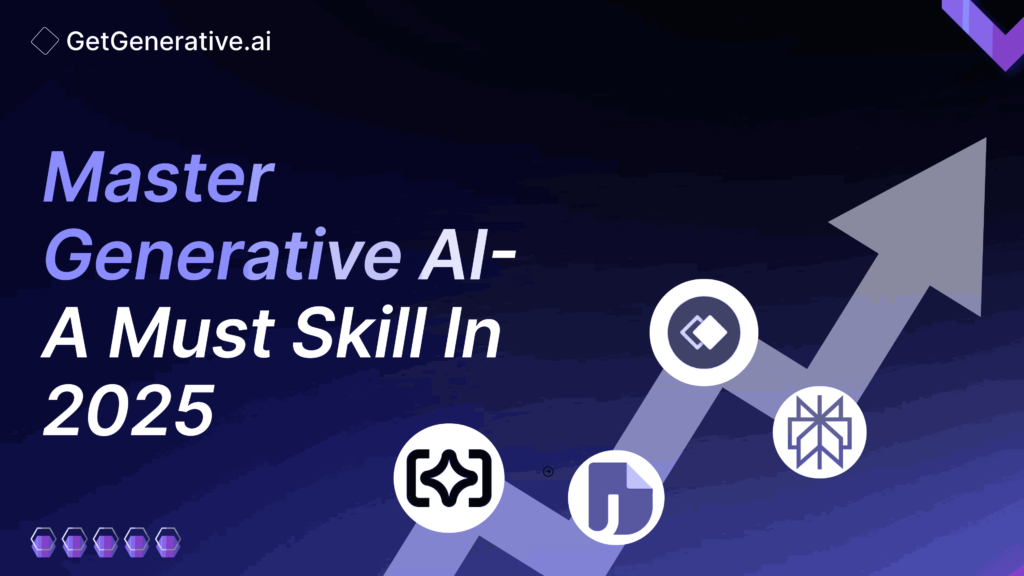Master Generative AI – A Must Skill in 2025
ChatGPT and Midjourney really have changed our lives. In fact, Salesforce reports that 73% of the users are now utilizing generative AI.
Mastering generative AI is crucial for opening up new career paths in various industries. In this blog, we will understand what top skills you must learn to get ahead in the AI era.
What is Generative AI?
Generative AI generates everything from text, images, and music to more complex content like videos and entire business solutions. It’s like having a smart assistant that doesn’t just follow rules but also creates things from scratch.
Top Skills to Master in Generative AI
1. Data Science and Analytics
Understanding and interpreting large datasets is essential for generative AI. Data science skills enable you to gather, clean, and process data efficiently, which serves as the foundation for AI models.
It’s essential to have expertise in tools like SQL, Python, and R, along with deep learning frameworks such as TensorFlow and PyTorch. Data scientists must also excel in data visualization techniques to interpret AI model outputs and communicate findings effectively.
2. Artificial Intelligence and Machine Learning
At the heart of generative AI lies machine learning (ML), which powers the creation of models that can generate new data. Mastering ML algorithms, neural networks, and reinforcement learning is non-negotiable.
Proficiency in both supervised and unsupervised learning, along with practical experience in training AI models, is fundamental. Proficiency in deep learning techniques, such as transformers and generative adversarial networks GANs), will take your expertise to the next level.
3. Cloud Computing
Mastering cloud infrastructure allows AI professionals to deploy models faster, utilize GPU and TPU resources for training, and ensure high availability and security for AI solutions. Familiarity with cloud-native tools like Kubernetes and Docker also enhances model deployment and scaling.
4. Coding
Coding forms the backbone of AI development. Fluency in programming languages like Python, which is the dominant language in AI, is mandatory. Other languages such as Java, C++, and R also play significant roles in specific use cases.
Additionally, the ability to write clean, efficient, and optimized code is crucial for developing sophisticated AI models. Proficiency in AI-related libraries like NumPy, Keras, and OpenCV ensures seamless integration of various AI processes.
5. Cybersecurity
With AI’s increasing adoption comes greater vulnerability to cyber threats. Generative AI models must be designed with cybersecurity in mind to prevent misuse or exploitation.
Mastering concepts like encryption, authentication, and securing AI pipelines is essential. Understanding how to protect sensitive data, ensure secure APIs, and detect malicious activities within AI systems will be critical as generative AI tools are deployed at scale.
6. Product Management
Generative AI doesn’t operate in isolation—it’s integrated into products that deliver value to end-users. Product management skills are crucial for AI professionals to align technical teams with business objectives.
Understanding customer pain points, crafting AI solutions that solve real-world problems, and overseeing the product lifecycle from ideation to deployment are essential skills for any generative AI expert. Familiarity with agile methodologies enhances the speed and efficiency of product development cycles.
7. Digital Marketing
Generative AI is revolutionizing digital marketing by creating personalized, AI-driven campaigns. Mastering AI’s role in marketing automation, ad optimization, and content generation is crucial.
Understanding AI-powered tools for SEO, customer segmentation, and dynamic content personalization can significantly boost your marketing efforts.
Also Read – Generative AI Glossary: A Complete Guide to Key Terms and Concepts
How to Acquire Essential AI Skills for Future-Proof Careers
Here’s a concise guide on how to gain these essential skills:
1. Enroll in Specialized Learning Programs
Join AI-focused courses offered by platforms like Coursera and Udemy. Ensure that your learning program includes fundamental topics such as machine learning, deep learning, and natural language processing.
2. Leverage Professional Networks
Engage with industry-specific associations and attend their conferences. Networking with AI professionals helps you stay updated on trends and opens doors to mentorship and collaboration.
3. Participate in Online Communities
Join AI-focused forums like Reddit, GitHub, and Stack Overflow. These platforms offer valuable insights, open-source projects, and discussions that enhance your AI expertise.
4. Undertake Skill-Specific Training
Attend workshops, hackathons, and seminars. Hands-on learning experiences enable the practical application of AI concepts in real-world scenarios and help build essential skills.
5. Follow AI Thought Leaders and Trends
Stay informed by following AI influencers on social media and reading industry publications. Keeping up with the latest breakthroughs and industry standards is essential for excelling in AI development.
Overcoming Challenges in Learning Generative AI
Mastering generative AI involves overcoming various obstacles due to its complexity and continuous advancements. Below are specific challenges and strategies to tackle them effectively.
Steep Learning Curve in Understanding Algorithms
Generative AI models like GANs and transformers are intricate. To tackle this, begin with simpler algorithms such as decision trees or linear regression before progressing.
Limited Access to Computational Resources
Training AI models demands substantial computational power. Utilize cloud-based platforms such as Google Colab or AWS, which offer free or affordable access to GPUs and TPUs. These platforms provide the opportunity to work with large models without requiring costly hardware.
Difficulty in Managing Large Datasets
Generative AI relies heavily on large datasets, which can be overwhelming to handle. Learning efficient data management techniques such as data augmentation and preprocessing tools like pandas and NumPy can ease this challenge. Efficient handling ensures smoother model training.
Also Read – Real-World Applications of Generative AI for Salesforce Consultants
Navigating Ethical and Bias Concerns
Generative AI models can unintentionally amplify biases present in training data. To overcome this, implement bias detection frameworks like Fairlearn or AI Fairness 360 and integrate ethical AI practices. Prioritize fairness and transparency throughout model development.
Staying Updated with Rapid Advancements
AI evolves rapidly, with constant innovations in models and techniques. Stay current by following research on arXiv, engaging in AI conferences, and contributing to online communities. Continuous learning is key to staying ahead in the ever-changing AI landscape.
Summing Up
Mastering generative AI is no longer optional; it’s a crucial skill set for anyone looking to stay relevant and competitive in the ever-evolving tech landscape. From data science to machine learning, acquiring these skills will not only future-proof your career but also open doors to exciting new opportunities in AI-driven industries.
Boost your Salesforce consulting services with GetGenerative.ai. Seamlessly craft exceptional proposals, freeing up more time to deliver outstanding client experiences.
Get started today!




